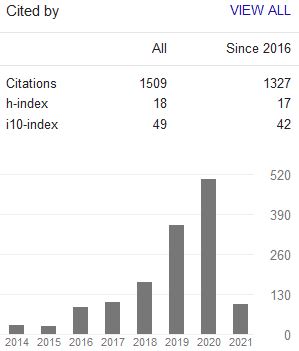MARKET SEGMENTATION FOR QURBAN DONORS OF ZAKAT AMIL INSTITUTION
Abstract
Keywords
Full Text:
PDFReferences
Ajzen, I. “The Theory of Planned Behavior”. Organizational Behavior and Human Decision Processes 50, 2 (1991).
Alhidari, IS., TM. Veludo-de-Oliveira, SY. Yousafzai, & M. Yani-de-Soriano. “Modeling the Effect of Multidimensional Trust on Individual Monetary Donations to Charitable Organizations”. Nonprofit and Voluntary Sector Quarterly 47, 3 (2018).
Amalia, M. Mempererat Ukhuwah Islamiyah di Masa Pandemi Covid-19. Banten: Makmood Publishing, 2020.
Amin, MM. Moralitas Pembangunan: Perspektif Agama-agama di Indonesia. Yogyakarta: Nahdlatul Ulama, 1994.
Arsyianti LD., & S. Kassim, “Regular Charity Giving Behavior Among Low-income Households in Indonesia”. Intellectual Discourse 24, 1 (2016).
Beldad, A., B. Snip, & J. van Hoof. “Generosity The Second Time Around: Determinants Of Individuals’ Repeat Donation Intention”. Nonprofit and Voluntary Sector Quarterly 43, 1 (2014).
Bin-Nashwan, SA., H. Abdul-Jabbar, SA. Aziz, & A. Haladu, “Zakah Compliance Behavior Among Entrepreneurs: Economic Factors Approach”. International Journal of Ethics and Systems 36, 2 (2020).
Daud, MS., H. Wahid, & MAM. Noor, “The Influences of Attitude, Religiosity, and Subjective Norm on Muslim's Donation Intention during COVID-19 Lockdown in Malaysia”. International Journal of Sustainable Development & Planning 17, 3 (2022).
de Abreu, ME., RMS. Laureano, RV. da Silva, & P. Dionísiol. “Framing Charitable Appeals: The Effect Of Message Framing And Perceived Susceptibility To The Negative Consequences Of Inaction On Donation Intention”. International Journal of Nonprofit and Voluntary Sector Marketing 276 (2015).
Dunakhir, S. “Kualitas Jasa Audit dalam Perspektif Dimensi Budaya Hofstede”. Business Management Journal 18, 2 (2022).
Ediyanto, NM. Mara, & N. Satyahadewi, “Pengklasifikasian Karakteristik dengan Metode K-Means Cluster Analysis”. Buletin Ilmiah Matematika, Statistika dan Terapannya 2, 2 (2013).
Hariansyah, N. “Segmentasi pasar dalam komunikasi pemasaran Islam”. Jurnal Al-Hikmah 19, 2 (2021).
Herwani, H. ”Ukhuwah Islamiyah dalam pandangan Al-Qur’an”. Cross-border 3, 2 (2020).
Hisyam, CJ. Sistem sosial budaya Indonesia. Jakarta: Bumi Aksara, 2021.
Kashif, M., S. Sarifuddin, & A. Hassan. “Charity donation: Intentions and behaviour”. Marketing Intelligence & Planning 33, 1 (2015).
Kasri, RA. “Giving behaviors in Indonesia: motives and marketing implications for Islamic charities”. Journal of Islamic Marketing 4, 3 (2013).
Kasri, RA., & UH. Ramli. ”Why do Indonesian Muslims Donate Through Mosques? A Theory of Planned Behavior Approach”. International Journal of Islamic and Middle Eastern Finance and Management 12, 5 (2019).
Kotler P. & K. L. Keller. Marketing management (15th ed.). England: Pearson Education Limited, 2016.
Maulana, MHH. “The Effect of Emotional Marketing on Donation Intention (Study on Advertising in kitabisa.com crowdfunding media platform”. Jurnal Ilmiah Mahasiswa FEB 8, 2 (2020).
Musa, Armiadi et. al. “Digital-Based Information System of Zakat Management in Indonesia: Strategies for Increasing Revenue in Fiqh Muamalah Perspectives”. Samarah: Jurnal Hukum Keluarga dan Hukum Islam 6, 2 (2022).
Pemintaan Hewan Kurban Naik, Kementerian Pertanian Pastikan Stok Aman. Accessed on 23 November 2023 from https://kominfo.jatimprov.go.id/berita/pemintaan-hewan-kurban-naik-kementerian-pertanian-pastikan-stok-aman
Pizarro, D.”Nothing more than Feelings? The Role of Emotions in Moral Judgment”. Journal for the Theory of Social Behavior 30, 4 (2000).
Ranganathan SK., & WH. Henley, “Determinants Of Charitable Donation Intentions: A Structural Equation Model”. International Journal Of Nonprofit And Voluntary Sector Marketing 13, 1 (2008).
Rizqon, FA. “Penguatan Pendidikan Agama Islam Tentang Ubudiyah Melalui Pembelajaran Kitab Fathul Qorib (Studi Kasus Di Madrasah Aliyah Darussalam Krempyang Tanjunganom Nganjuk,” Dissertation, IAIN Kediri (2020).
Saidurrahman. “The Politics of Zakat Management in Indonesia: The Tension Between BAZ and LAZ”. Journal of Indonesian Islam 7, 2 (2013).
Shukor, SA., IF. Anwar, SA. Aziz, & H. Sabri. “Muslim Attitude Towards Participation In Cash Waqf: Antecedents and Consequences”. International Journal of Business and Society 18,1 (2017).
Smith J. R. & A. McSweeney. “Charitable giving: The effectiveness of a revised theory of planned behavior model in predicting donating intentions and behavior”. Journal of Community & Applied Social Psychology 17, 5 (2007).
Smith, JR., & A. McSweeney. “Charitable Giving: The Effectiveness of a Revised Theory of Planned Behavior Model in Predicting Donating Intentions and Behavior”. Journal of Community & Applied Social Psychology 17, 5 (2007).
Warner, CM., R. Kılınç, CW. Hale, AB. Cohen, & KA. Johnson, “Religion and Public Goods Provision: Experimental and Interview Evidence from Catholicism and Islam in Europe”. Comparative Politics 47, 2 (2015).
DOI: 10.15642/JIIS.2023.17.2.403-422
Refbacks
- There are currently no refbacks.
Indexed by:
Journal of Indonesian Islam (ISSN 1978-6301 and E-ISSN 2355-6994) is published by the Postgraduate Program (PPs) and the Institute for the Study of Religion and Society (LSAS), State Islamic University (UIN) of Sunan Ampel Surabaya.
Journal of Indonesian Islam by http://jiis.uinsby.ac.id/index.php/JIIs/index is licensed under a Creative Commons Attribution-ShareAlike 4.0 International License.
Copyright ©2020 State Islamic University (UIN) of Sunan Ampel Surabaya. Powered by Public Knowledge Project OJS.







